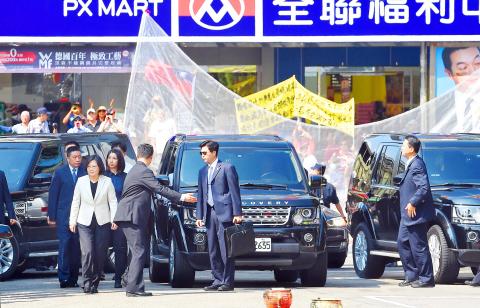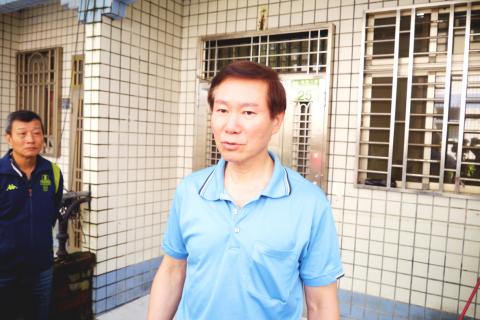High supporter numbers, leaks in the police department and assistance from former police officers are enabling protesters to run effective “guerrilla” campaigns, despite increased security around President Tsai Ing-wen (蔡英文), pension reform opponents said yesterday, adding that “mobile human wall” tactics to keep them away from Tsai’s motorcade would not work.
Protesters have promised to “shadow” Tsai following the passage of pension reforms last month and have had some success in breaking through an increased police presence around the president, including briefly halting her motorcade outside National Defense University in Taipei’s Beitou District (北投) on Thursday last week.
“There are only two roads in and out of the university, so where could she go? The police cannot change the roads,” said Keng Chi-wen (耿繼文), a former director of the National Police Agency’s Internal Affairs Office, who has been one of the most prominent former police officers participating in protests.

Photo: Liu Hsin-de, Taipei Times
Protesters stood along both sides of Zhongyang N Road, moving in front of Tsai’s motorcade as it approached the university entrance before being pushed aside by police.
An increased police presence and barricades around Tsai to keep protesters from getting too close when she arrives at a destination means that “guerrilla” tactics have been used to get close to her, with former police officers who are familiar with presidential security helping show protesters how to congregate and scatter along potential motorcade routes, Keng said.
“We are experts, so it is easy for us to predict the president’s route and backup route,” he said, adding that protesters also often receive leaked information from police.

Photo: Wang Chun-chi, Taipei Times
“We can make quick observations and then divide our forces along potential routes, so there is a chance of blocking her regardless of which way they drive,” he said.
“It might be different if Tsai was just a movie star who could come and go quietly, but presidential security leaves an extremely obvious footprint,” Taiwan Policemen Association executive director Chen Chih-chieh (陳志傑) said, adding that protesters relay signs of police reconnaissance and barricading via social media to predict the president’s movements and mobilize quickly.
“There are different standard operating procedures for the president compared with the vice president or a minister, so we can predict who is coming based on police preparations,” Chen said.
Reports that police plan to begin deploying a “mobile human wall” to counter protesters’ tactics drew disparaging remarks.
“Even if they block off one point, we will just catch Tsai later on,” Keng said.
“Even if the wall succeeds, the sight of policemen being forced to run around would still be embarrassing to Tsai, which is our objective,” Chen said.
It is possible Tsai might be faced with a car suddenly “breaking down” in front of her motorcade, Yunlin County Retired Police Officers Association executive director Lai Kun-yu (賴坤柚) said.

A magnitude 7.0 earthquake struck off Yilan at 11:05pm yesterday, the Central Weather Administration (CWA) said. The epicenter was located at sea, about 32.3km east of Yilan County Hall, at a depth of 72.8km, CWA data showed There were no immediate reports of damage. The intensity of the quake, which gauges the actual effect of a seismic event, measured 4 in Yilan County area on Taiwan’s seven-tier intensity scale, the data showed. It measured 4 in other parts of eastern, northern and central Taiwan as well as Tainan, and 3 in Kaohsiung and Pingtung County, and 2 in Lienchiang and Penghu counties and 1

FOREIGN INTERFERENCE: Beijing would likely intensify public opinion warfare in next year’s local elections to prevent Lai from getting re-elected, the ‘Yomiuri Shimbun’ said Internal documents from a Chinese artificial intelligence (AI) company indicated that China has been using the technology to intervene in foreign elections, including propaganda targeting Taiwan’s local elections next year and presidential elections in 2028, a Japanese newspaper reported yesterday. The Institute of National Security of Vanderbilt University obtained nearly 400 pages of documents from GoLaxy, a company with ties to the Chinese government, and found evidence that it had apparently deployed sophisticated, AI-driven propaganda campaigns in Hong Kong and Taiwan to shape public opinion, the Yomiuri Shimbun reported. GoLaxy provides insights, situation analysis and public opinion-shaping technology by conducting network surveillance

‘POLITICAL GAME’: DPP lawmakers said the motion would not meet the legislative threshold needed, and accused the KMT and the TPP of trivializing the Constitution The Legislative Yuan yesterday approved a motion to initiate impeachment proceedings against President William Lai (賴清德), saying he had undermined Taiwan’s constitutional order and democracy. The motion was approved 61-50 by lawmakers from the main opposition Chinese Nationalist Party (KMT) and the smaller Taiwan People’s Party (TPP), who together hold a legislative majority. Under the motion, a roll call vote for impeachment would be held on May 19 next year, after various hearings are held and Lai is given the chance to defend himself. The move came after Lai on Monday last week did not promulgate an amendment passed by the legislature that

AFTERMATH: The Taipei City Government said it received 39 minor incident reports including gas leaks, water leaks and outages, and a damaged traffic signal A magnitude 7.0 earthquake struck off Taiwan’s northeastern coast late on Saturday, producing only two major aftershocks as of yesterday noon, the Central Weather Administration (CWA) said. The limited aftershocks contrast with last year’s major earthquake in Hualien County, as Saturday’s earthquake occurred at a greater depth in a subduction zone. Saturday’s earthquake struck at 11:05pm, with its hypocenter about 32.3km east of Yilan County Hall, at a depth of 72.8km. Shaking was felt in 17 administrative regions north of Tainan and in eastern Taiwan, reaching intensity level 4 on Taiwan’s seven-tier seismic scale, the CWA said. In Hualien, the